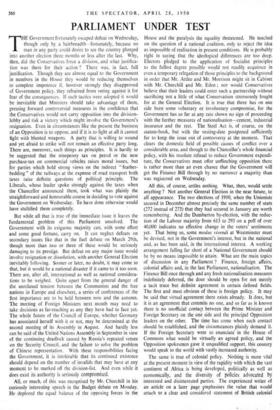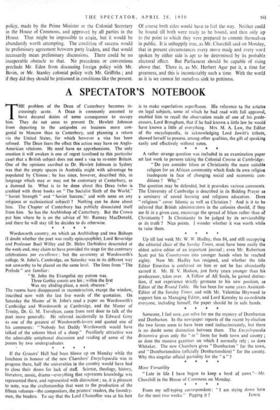PARLIAMENT UNDER TEST
THE Government fortunately escaped defeat on Wednesday, though only by a hairbreadth—fortunately, because no man in any party could desire to see the country plunged into another election three months or less after the last. Why, then, did the Conservatives force a division,.and what justifica- tion was there for their action ? There was, in fact, full justification. Though they are almost equal to the Government in numbers in the House they would be reducing themselves to complete impotence if, however strongly they disapproved of Government policy, they refrained from voting against it for fear of the consequences. If such tactics were adopted it would be inevitable that Ministers should take advantage of them, pressing forward controversial measures in the confidence that the Conservatives would not carry opposition into the division- lobby and risk a victory which might involve the Government's resignation. Even in circumstances like the present the business of an Opposition is to oppose, and if it is to fight at all it cannot fight with blunted weapons. A party that is willing to wound and yet afraid to strike will not remain an effective party long. There are, moreover, such things as principles. It is hardly to be suggested that the ninepenny tax on petrol or the new purchase-tax on commercial vehicles raises moral issues, but for parties which hold strong views on the indirect " feather- bedding " of the railways at the expense of road transport both taxes raise definite questions of political principle. The Liberals, whose leader spoke strongly against the taxes when the Chancellor announced them, took what was plainly the straightforward and honourable course in deciding to vote against the Government on Wednesday. To have done otherwise would have stultified them completely.
But while all that is true of the immediate issue it leaves the fundamental problem of this Parliament unsolved. The Government with its exiguous majority can, with some effort and some good fortune, carry on. It can neglect defeats on secondary issues like that in the fuel debate on March 29th, though more than two or three of these would be seriously damaging to its prestige. But defeat on any major issue would involve resignation or dissolution, with another General Election inevitably following. Sooner or later, no doubt, it may come to that, but it would be a national disaster if it came-to it too soon. There are, after all, international as well as national considera- tions to be weighed. Quite apart from the general danger of the unrelaxed tension between the Communists and the free nations in Europe and elsewhere, a series of conferences of the first importance are to be held between now and the autumn. The meeting of Foreign Ministers next month may need to take decisions as far-reaching as any they have had to face yet. The whole future of the Council of Europe, whether Germany has associated herself with it or not, may be determined at the second meeting of its Assembly in August. And hardly less can be said of the United Nations Assembly in September in view of the continuing deadlock caused by Russia's repeated vetoes on the Security Council, and the failure to solve the problem of Chinese representation. With these responsibilities facing the Government, it is intolerable that its continued existence should depend on the number of invalids that may have at any moment to be marked off the division-list. And even while it does exist its authority is seriously compromised.
All, or much, of this was recognised by Mr. Churchill in his curiously interesting speech in the Budget debate on Monday. He deplored the equal balance of the opposing forces in the House and the paralysis the equality threatened. Be touched on the question of a national coalition, only to reject the idea as impossible of realisation in present conditions. He is probably right in saying that the ideological differences are too deep. Electors pledged to the application of Socialist principles to the fullest degree possible would not readily acquiesce in even a temporary relegation of those principles to the background in order that Mr. Attlee and Mr. Morrison might sit in Cabinet with Mr. Churchill 4nd Mr. Eden ; nor would Conservatives believe that their leaders could enter such a partnership without sacrificing not a little of what Conservatism strenuously fought for at the General Election. It is true that there has on one side been some voluntary or involuntary compromise, for the Government has so far at any rate shown no sign of proceeding with the further measures of nationalisation—cement, industrial insurance and the rest. The Steel Act is, of course, on the statute-book, but with the vesting-date postponed sufficiently far to keep the issue out of controversy at the moment. That clears the domestic field of possible causes of conflict over a considerable area, and though to the Chancellor's whole financial policy, with his resolute refusal to reduce Government expendi- ture, the Conservatives must offer unflinching opposition there is rather more than an even chance that the Government will get the Finance Bill through by no narrower a majority than was registered on Wednesday.
All this, of course, settles nothing. What, then, would settle anything ? Not another General Election in the near future, to all appearance. The two elections of 1910, when the Unionists secured in December almost precisely the same number of seats (272 instead of 273) that they had secured in January are worth remembering. And the Dumbarton by-election, with the reduc- tion of the Labour majority from 613 to 293 on a poll of over 40,000 indicates no effective change in the voters' sentiments yet. That being so, some modus vivendi at Westminster must be devised, not in the Government's interest, but in the national and, as has been said, in the international interest. A working arrangement falling far short of a National Government should be by no means impossible to attain. What are the main topics of discussion in any Parliament ? Finance, foreign affairs, colonial affairs and, in the last Parliament, nationalisation. The Finance Bill once through and any fresh nationalisation measures indefinitely deferred, the door should be open for not merely a tacit truce but definite agreement in certain defined fields. The first and most obvious of these is foreign policy. It may be said that virtual agreement there exists already. It does, but it is an agreement that commits no one, and so far as is known there is no unofficial contact between the Prime Minister and Foreign Secretary on the one side and the principal Opposition leaders on the other. The time has come when such contact -should be established, and the circumstances plainly demand it. If the Foreign Secretary were to enunciate in the House of Commons what would be virtually an agreed policy, and the Opposition spokesmen gave it unqualified support, this country would speak to the world with vastly increased authority.
The same is true of colonial policy. Nothing is more vital at the present moment in view of the rapidity with which the vast continent of Africa is being developed, politically as well as economically, and the diversity of policies advocated by interested and disinterested parties. The experienced writer of an article on a later page ymphasises the value that would attach to a clear and considered statement of British colonial policy, made by the Prime Minister or the Colonial Secretary in the House of Commons, and approved by all parties in the House. That might be impossible to attain, but it would be abundantly worth attempting. The condition of success would be preliminary agreement between party leaders, and that would necessarily mean preliminary discussions. There could be no insuperable obstacle to that. No precedents or conventions preclude Mr. Eden from discussing foreign policy with Mr. Bevin, or Mr. Stanley colonial policy with Mr. Griffiths ; and if they did they should be jettisoned in conditions like the present. Of course both sides would have to feel the way. Neither could be bound till both were ready to be bound, and then only up to the point to which they were prepared to commit themselves in public. It is unhappily true, as Mr. Churchill said on Monday. that in present circumstances every move madg and every word spoken by either side is apt to be determined by its probable electoral effect. But Parliament should be capable of rising above that. There is, as Mr. Herbert Agar put it, a time for greatness, and this is incontestably such a time. With the world as it is we cannot let ourselves sink to pettiness.











































 Previous page
Previous page